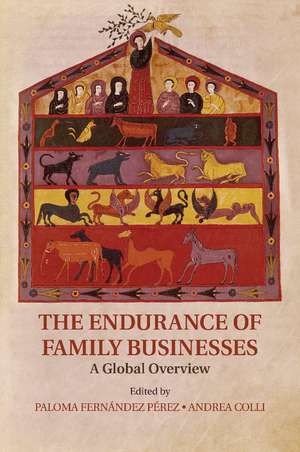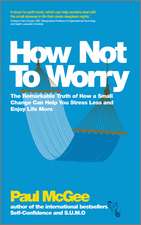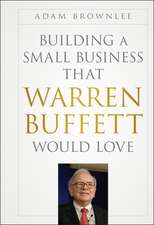The Endurance of Family Businesses: A Global Overview
Editat de Paloma Fernandez Perez, Andrea Collien Limba Engleză Paperback – 31 dec 2014
| Toate formatele și edițiile | Preț | Express |
|---|---|---|
| Paperback (1) | 294.14 lei 6-8 săpt. | |
| Cambridge University Press – 31 dec 2014 | 294.14 lei 6-8 săpt. | |
| Hardback (1) | 695.93 lei 6-8 săpt. | |
| Cambridge University Press – 29 sep 2013 | 695.93 lei 6-8 săpt. |
Preț: 294.14 lei
Nou
Puncte Express: 441
Preț estimativ în valută:
56.28€ • 58.76$ • 46.58£
56.28€ • 58.76$ • 46.58£
Carte tipărită la comandă
Livrare economică 04-18 aprilie
Preluare comenzi: 021 569.72.76
Specificații
ISBN-13: 9781107480513
ISBN-10: 1107480515
Pagini: 308
Ilustrații: 10 b/w illus. 10 tables
Dimensiuni: 152 x 228 x 18 mm
Greutate: 0.45 kg
Editura: Cambridge University Press
Colecția Cambridge University Press
Locul publicării:New York, United States
ISBN-10: 1107480515
Pagini: 308
Ilustrații: 10 b/w illus. 10 tables
Dimensiuni: 152 x 228 x 18 mm
Greutate: 0.45 kg
Editura: Cambridge University Press
Colecția Cambridge University Press
Locul publicării:New York, United States
Cuprins
Introduction: a global revolution: the endurance of large family businesses around the world Paloma Fernandez Perez and Andrea Colli; Part I. Theoretical Issues and Debates: 1. The emergence of family business studies: a historical approach to pioneering centers, scholars, and ideas Paloma Fernandez Perez and Nuria Puig; 2. Family firm longevity: a balancing act between continuity and change Pramodita Sharma and Carlo Salvato; 3. Family values or crony capitalism Harold James; 4. Risk, uncertainty, and family ownership Andrea Colli; Part II. Exogenus Factors: The Environment: 5. Entrepreneurial spirit in the evolution of Swedish family businesses Hans Sjögren; 6. Cultural forces in large family firm persistence: a model based upon the case project Vipin Gupta; 7. Family firms and the new multinationals: evidence from Spain Mauro F. Guillén and Esteban Garcia Canal; 8. Finance and family-ness: a historical overview of assessing the economics of kinship Christopher Kobrak and Pramuan Bunkanwanicha; Part III. Endogenous Determinants: Inside the Black Box: 9. The women of the family business Christine Blondel and Marina Niforos; 10. The role of values in family-owned firms Remei Agulles, Lucia Ceja and Josep Tàpies; 11. Managing professionalization in family business: transforming strategies for managerial succession and recruitment in family firms in the twentieth century Susanna Fellman.
Recenzii
'Family business is everywhere but remains an elusive subject for researchers. The essays in this volume provide a refreshingly broad perspective by engaging deeply with the historical, global, cultural, and gender complexities involved in understanding this vibrant form of business ownership.' Geoffrey Jones, Isidor Straus Professor of Business History, Harvard Business School
'This volume provides a relevant contribution in the field of family business studies. Bringing together the longitudinal approach of traditional business history with the analytical focus of management studies, [it] provides an important overview of the most recent research in the study of family firms. The essays assembled here are particularly relevant for those interested in issues such as the evolution of the forms of big business enterprises and the longevity and endurance of family firms, as well as their management, ownership, and governance models. There are additional insights in the interdisciplinary debate concerning 'varieties of capitalism'. In short, this book can be labeled an essential instrument that will enhance our knowledge of the modern enterprise and the special role that family businesses play.' Franco Amatori, Bocconi University
'This book combines the research of business historians and management scholars to help us understand why, despite some critics' claims to the contrary, family businesses constitute an enduring form of organization. By exploring how family businesses from around the world have evolved in response to changing socioeconomic trends such as globalization, the convergence of gender roles, or the generalization of the availability of educational opportunities, the different chapters build on one another to support the editors' thesis that we are witnessing a 'global revolution' in the way that families manage and govern their businesses.' Belén Villalonga, NYU Stern School of Business
'Comprehensive and detailed, this is a definitive, up-to-date, scholarly resource for family business historians and field practitioners alike … This book presents many interesting hypotheses and frameworks. It makes an excellent scholarly case for what business families and their advisors want and need: institutions that make more and bigger investments in the field of family business studies. In the past, critics claimed that only families in business stand to benefit from this research. The facts in this book put that argument to rest once and for all. A better understanding of family business will not only be good for every country where these economic activities thrive but will be essential for sustaining the global economy.' John A. Davis, Chairman, Cambridge Institute for Family Enterprise
'This volume provides a relevant contribution in the field of family business studies. Bringing together the longitudinal approach of traditional business history with the analytical focus of management studies, [it] provides an important overview of the most recent research in the study of family firms. The essays assembled here are particularly relevant for those interested in issues such as the evolution of the forms of big business enterprises and the longevity and endurance of family firms, as well as their management, ownership, and governance models. There are additional insights in the interdisciplinary debate concerning 'varieties of capitalism'. In short, this book can be labeled an essential instrument that will enhance our knowledge of the modern enterprise and the special role that family businesses play.' Franco Amatori, Bocconi University
'This book combines the research of business historians and management scholars to help us understand why, despite some critics' claims to the contrary, family businesses constitute an enduring form of organization. By exploring how family businesses from around the world have evolved in response to changing socioeconomic trends such as globalization, the convergence of gender roles, or the generalization of the availability of educational opportunities, the different chapters build on one another to support the editors' thesis that we are witnessing a 'global revolution' in the way that families manage and govern their businesses.' Belén Villalonga, NYU Stern School of Business
'Comprehensive and detailed, this is a definitive, up-to-date, scholarly resource for family business historians and field practitioners alike … This book presents many interesting hypotheses and frameworks. It makes an excellent scholarly case for what business families and their advisors want and need: institutions that make more and bigger investments in the field of family business studies. In the past, critics claimed that only families in business stand to benefit from this research. The facts in this book put that argument to rest once and for all. A better understanding of family business will not only be good for every country where these economic activities thrive but will be essential for sustaining the global economy.' John A. Davis, Chairman, Cambridge Institute for Family Enterprise
Descriere
A collection of essays offering an overview of the importance and resilience of family-controlled large businesses.











